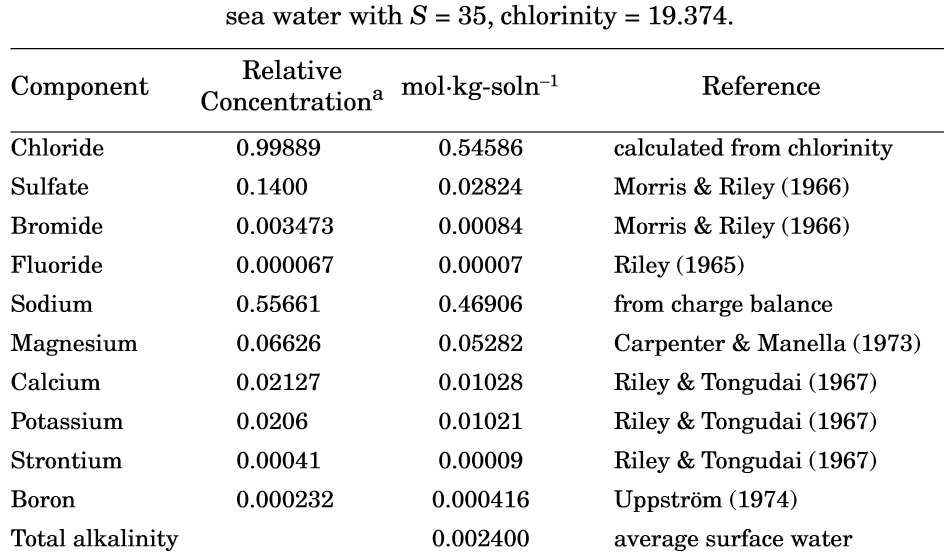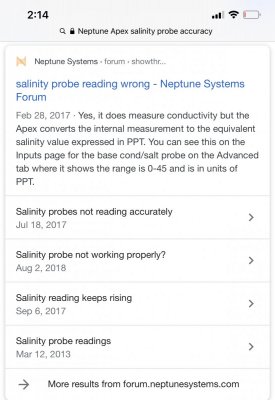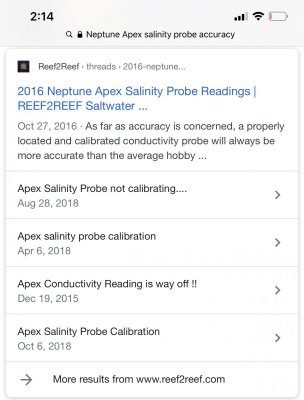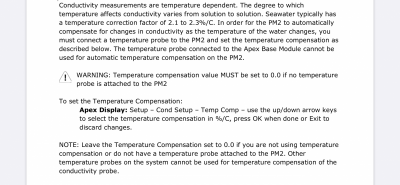Navigation
Install the app
How to install the app on iOS
Follow along with the video below to see how to install our site as a web app on your home screen.
Note: This feature may not be available in some browsers.
More options
You are using an out of date browser. It may not display this or other websites correctly.
You should upgrade or use an alternative browser.
You should upgrade or use an alternative browser.
NEW HI98319 Hanna Waterproof Salinity and Temperature Tester
- Thread starter Hanna Instruments
- Start date
- Tagged users None
Users Who Are Viewing This Thread (Total: 1, Members: 0, Guests: 1)
I want to like and trust this salinity tester. I sent to Hanna to have them check it out, and they said it seemed to be within tolerances. They sent me a new one (at least I think its a new one) and it also reads low.
I also took the new meter, a water sample, and my equipment with calibration fluid to my LFS where I bought it. They had the same issue of the meter reading low, even after calibration and comparing to their store equipment, consistently low.
What is odd is this. I bought a packet of Neptune Systems salinity/conductivity calibration fluid, which is 53,000 microsiemens ( 35 ppt) which should be the same as the Hanna calibration fluid. If I calibrate the Hanna checker with the Neptune solution, it is spot on with my calibrated refractometer. If I calibrate with Hanna solution, consistently 2-3 ppt lower than refractometer. IS IT A CALIBRATION FLUID ISSUE?
I have now bought a Milwaukee digital refractometer, should have saved my money and skipped the Hanna....spent $200 now when it could have been $130.
I also took the new meter, a water sample, and my equipment with calibration fluid to my LFS where I bought it. They had the same issue of the meter reading low, even after calibration and comparing to their store equipment, consistently low.
What is odd is this. I bought a packet of Neptune Systems salinity/conductivity calibration fluid, which is 53,000 microsiemens ( 35 ppt) which should be the same as the Hanna calibration fluid. If I calibrate the Hanna checker with the Neptune solution, it is spot on with my calibrated refractometer. If I calibrate with Hanna solution, consistently 2-3 ppt lower than refractometer. IS IT A CALIBRATION FLUID ISSUE?
I have now bought a Milwaukee digital refractometer, should have saved my money and skipped the Hanna....spent $200 now when it could have been $130.
- Joined
- Apr 15, 2019
- Messages
- 576
- Reaction score
- 631
That's interesting on the calibration solution. Did you get both solutions up to aquarium temp before calibration?
FYI, I ended up with the Milwaukee as well and it matches my calibrated red sea probe.
FYI, I ended up with the Milwaukee as well and it matches my calibrated red sea probe.
Last edited:
Yes, ever since the first couple times of calibrating and it reading low, I have let the calibration packets soak in the sump for an hour before calibration.That's interesting on the calibration solution. Did you get both solutions up to aquarium temp before calibration?
FYI, I ended up with the Milwaukee as well and it matches my calibrated red sea probe.
My final report on my battle with my confidence in this Hanna Salinity checker, which now I believe is due to the Hanna calibration fluid.
My Milwaukee Digital Refractometer got delivered yesterday, so ran my last tests with the Hanna tester as the comparisons of my tank water. I try to keep my tank at 34 to 34.5 ppt, but overfilled a little from last water change so salinity has crept up following evaporation.
Handheld refractometer, calibrated with BRS calibration fluid: 35 ppt
Neptune Apex Salinity Probe, calibrated with Neptune's Calibration Fluid: 34.8 ppt
Neptune Apex Salinity Probe, calibrated with HANNA Calibration Fluid: 32.9 ppt
Hanna HI98319, calibrated with Neptune's Calibration Fluid: 34.9 ppt
Hanna HI98319, calibrated with HANNA Calibration Fluid: 32.6 ppt
Milwaukee Digital Refractometer, calibrated with Milwaukee Calibration Fluid: 35 ppt
So using the Hanna conductivity calibration fluid consistently 2-3 ppt lower than everything else, but approximately same numbers when using Neptune's conductivity calibration fluid with the Hanna. I guess that 2-3 ppt difference is within Hanna's tolerance, but strange that readings using their calibration fluid is consistently lower than everything else but spot on with Neptune's calibration fluid. Guess I wasted money on the 25 pack of the Hanna calibration flluid.
My Milwaukee Digital Refractometer got delivered yesterday, so ran my last tests with the Hanna tester as the comparisons of my tank water. I try to keep my tank at 34 to 34.5 ppt, but overfilled a little from last water change so salinity has crept up following evaporation.
Handheld refractometer, calibrated with BRS calibration fluid: 35 ppt
Neptune Apex Salinity Probe, calibrated with Neptune's Calibration Fluid: 34.8 ppt
Neptune Apex Salinity Probe, calibrated with HANNA Calibration Fluid: 32.9 ppt
Hanna HI98319, calibrated with Neptune's Calibration Fluid: 34.9 ppt
Hanna HI98319, calibrated with HANNA Calibration Fluid: 32.6 ppt
Milwaukee Digital Refractometer, calibrated with Milwaukee Calibration Fluid: 35 ppt
So using the Hanna conductivity calibration fluid consistently 2-3 ppt lower than everything else, but approximately same numbers when using Neptune's conductivity calibration fluid with the Hanna. I guess that 2-3 ppt difference is within Hanna's tolerance, but strange that readings using their calibration fluid is consistently lower than everything else but spot on with Neptune's calibration fluid. Guess I wasted money on the 25 pack of the Hanna calibration flluid.
My readings have been fine, one piece of constuctive feedback is that it is VERY easy to accidentally go in to calibration mode and reset the parameters. A confirmation choice would be nice or a button that isn't right next to power would be nice in later versions. I've wasted a few calibration packets due to this. Other than that I love it, fresh water mixes consistently match my tank values.
For some multi-month use feedback, I now have two of these units and they are both exact on the calibration fluid, and water samples done.
Questions for @Hanna Instruments, what would you recommend for a sterilization process that will be friendly to the graphite probes?
Questions for @Hanna Instruments, what would you recommend for a sterilization process that will be friendly to the graphite probes?
Mine is also on point. Thanks @Hanna for making excellent products! 
After getting mine replaced, it has been perfect. Very happy with it!
hey all. I'll chime in too. I have:
Manual refractometer, Milwaukee digital refractometer, and a hanna salinity pen.
I am having the same issue with the Hanna. I freshly calibrate all, and I get the following when measuring my water:
Calibrated Refractometer: 1.028 SG (calibrated with steam distilled water)
Calibrated Milwaukee Digital Refractometer: 1.028 SG (calibrated with steam distilled water and their 1.025 SG cal solution)
Hanna Salinity Pen: 1.024 SG (calibrated with their 35ppt solution)
It looks like the issue is that the Hanna calibration fluid is bad. I just tested their 35ppt (1.0264 SG) calibration fluid with the calibrated refractometer and milwaukee digital, and they both say the Hanna cal solution measures 1.019 SG. Which explains why the hanna always reads significantly low.
@Hanna Instruments Have you had an issue with your calibration solutions? That is a pretty big delta. Do they go bad in the package or maybe stratify or something?
The real bummer is that I have been trusting the Hanna salinity pen for months and I have been apparently running my reef at 1.028 SG without knowing it :mad: . Time to slowly lower the salinity.
Manual refractometer, Milwaukee digital refractometer, and a hanna salinity pen.
I am having the same issue with the Hanna. I freshly calibrate all, and I get the following when measuring my water:
Calibrated Refractometer: 1.028 SG (calibrated with steam distilled water)
Calibrated Milwaukee Digital Refractometer: 1.028 SG (calibrated with steam distilled water and their 1.025 SG cal solution)
Hanna Salinity Pen: 1.024 SG (calibrated with their 35ppt solution)
It looks like the issue is that the Hanna calibration fluid is bad. I just tested their 35ppt (1.0264 SG) calibration fluid with the calibrated refractometer and milwaukee digital, and they both say the Hanna cal solution measures 1.019 SG. Which explains why the hanna always reads significantly low.
@Hanna Instruments Have you had an issue with your calibration solutions? That is a pretty big delta. Do they go bad in the package or maybe stratify or something?
The real bummer is that I have been trusting the Hanna salinity pen for months and I have been apparently running my reef at 1.028 SG without knowing it :mad: . Time to slowly lower the salinity.
hey all. I'll chime in too. I have:
Manual refractometer, Milwaukee digital refractometer, and a hanna salinity pen.
I am having the same issue with the Hanna. I freshly calibrate all, and I get the following when measuring my water:
Calibrated Refractometer: 1.028 SG (calibrated with steam distilled water)
Calibrated Milwaukee Digital Refractometer: 1.028 SG (calibrated with steam distilled water and their 1.025 SG cal solution)
Hanna Salinity Pen: 1.024 SG (calibrated with their 35ppt solution)
It looks like the issue is that the Hanna calibration fluid is bad. I just tested their 35ppt (1.0264 SG) calibration fluid with the calibrated refractometer and milwaukee digital, and they both say the Hanna cal solution measures 1.019 SG. Which explains why the hanna always reads significantly low.
@Hanna Instruments Have you had an issue with your calibration solutions? That is a pretty big delta. Do they go bad in the package or maybe stratify or something?
The real bummer is that I have been trusting the Hanna salinity pen for months and I have been apparently running my reef at 1.028 SG without knowing it :mad: . Time to slowly lower the salinity.
When comparing conductivity to refractometery to measure salinity, the consensus among the scientific community favors conductivity. This is because there are non-conductive material in your sample which can impact the refractive index of seawater but not the actual salt concentration. For example, if we add sugar to artificial seawater, we will see that our salinity value will increase but we have not changed the concentration of salt in the water. If we measured the salinity of that sample with our HI98319 conductivity meter you’ll notice the value is largely unchanged. It is common to have inflated values with a refractometer due to the large number of materials which will affect the density of that water outside of the dissolved salt values. For example, anti-caking agent in salt mixes, organic waste, sugars, potential non-ionic contaminants or uneaten fish food can increase the values produced on a refractometer but this would be less likely to occur on a conductivity meter like the HI98319. Added bonuses of using conductivity to measure salinity are that you no longer have a light interference, and the temperature compensation is of your direct sample and not as influenced by ambient atmosphere near the surface of a prism.
We use the international oceanographic tables to convert conductivity to salinity. This is the preferred method by most marine scientists. This uses a 35ppt potassium chloride conductivity standard as the baseline for salinity values. You cannot use our HI70024P calibration solution for refractometers. This is important as many hobbyists try and think our standard is bad when they use it on their refractometer. This is because refractometers standards are density based while ours is made for electrical conductivity. The science behind each measurement is fundamentally different.
When comparing salinity measurement instruments you must also factor in the accuracy statement of the respective devices in the results. For example our HI98319 has an accuracy statement of ±1ppt and our HI96822 digital refractometer is ±2 ppt. If we get a reading of 33ppt on our HI98319 and a reading of 35 on our HI96822 then the results are in spec. The measure of uncertainty for the HI98319 would be 32ppt-34ppt while the measure of uncertainty for the HI96822 would be 33ppt-37ppt. The values would fall in line of one another.
Also when you calibrate your HI98319 salinity and temperature tester make sure you tap the calibration sachet to dislodge any entrapped air bubbles from the tip of the electrode. Having air bubbles in the tip of the electrode can cause improper calibration.
For assistance regarding any technical support issue please email [email protected]
Ok understood that I cant measure the salinity of your cal solution with a refractometer, so that is not this issue.
Understood on accuracy and potential pitfalls of using refractometers vs conductivity based salinity checkers due to organics and other things in the water.
There seems to be a trend however of the conductivity checkers reading low in this thread. Is this just due to the organics and such in the water that you have mentioned? We have all been using refractometers for a long time and now we learn that they have all been reading artificially high for ages?
Man accuracy of 4ppt when the ideal range is about 2 or 3 ppt seems not ideal on the HI96822.
So which do I pay attention to... the refractometers reading high that have been used historically, or the conductivity checker that reads low but maybe more accurate? That is the question I guess.
Understood on accuracy and potential pitfalls of using refractometers vs conductivity based salinity checkers due to organics and other things in the water.
There seems to be a trend however of the conductivity checkers reading low in this thread. Is this just due to the organics and such in the water that you have mentioned? We have all been using refractometers for a long time and now we learn that they have all been reading artificially high for ages?
Man accuracy of 4ppt when the ideal range is about 2 or 3 ppt seems not ideal on the HI96822.
So which do I pay attention to... the refractometers reading high that have been used historically, or the conductivity checker that reads low but maybe more accurate? That is the question I guess.
This is the battle I think many of us were or currently dealing with and hard to over come. At the end of the day, it's about consistency. I'm rolling with my Hanna checker just because it's quick and easy to read. I keep my refractometer as a back up but won't ever use the two at the same time.
It's even worst because my Apex salinity probe reads 3ppt higher than the Hanna (lab grade).
Hanna 1.025 sg / 33 ppt @ 25°C
Apex 1.027 / 35.9 ppt @ 25°C
Refractormeter 1.029
It's even worst because my Apex salinity probe reads 3ppt higher than the Hanna (lab grade).
Hanna 1.025 sg / 33 ppt @ 25°C
Apex 1.027 / 35.9 ppt @ 25°C
Refractormeter 1.029
Last edited:
- Joined
- Apr 15, 2019
- Messages
- 576
- Reaction score
- 631
If you get an ICP test, there is a calculator to compute your salinity. This can be really useful to get a baseline for comparison.

 recifalnews.fr
recifalnews.fr

Compute salinity from sea water macro elements
Method for calculating the salinity of water from water macros elements that can be obtained with an ICP-OES water analysis of our tank.
Were they calibrated using the same fluid?It's even worst because my Apex salinity probe reads 3ppt higher than the Hanna (lab grade).
I'm going to check/compare mine tonight, FWIW my Milwaukee has always read one point lower regardless of cal solutions used. I emailed them about servicing the unit and received no reply.
When I hear people using the Milwaukee as a standard I get frustrated knowing that part of the problem lies there.
- Joined
- Feb 12, 2016
- Messages
- 371
- Reaction score
- 374
Anybody else see that most of the problems here are a lack of understanding the technological differences and how to use an accuracy statement.
Also for all of you “assuming” that your Apex is right you should look up all the problems Apex has with salinity. Not a good reference by any means. And also look up the accuracy statement for the Apex. A reading from an Apex of 35 and 33 from Hanna is within spec and doesn’t indicate a problem with either.
Also for all of you “assuming” that your Apex is right you should look up all the problems Apex has with salinity. Not a good reference by any means. And also look up the accuracy statement for the Apex. A reading from an Apex of 35 and 33 from Hanna is within spec and doesn’t indicate a problem with either.
- Joined
- Apr 16, 2018
- Messages
- 192
- Reaction score
- 137
I went through this whole process as well, they ended up sending me a "new" one, it sits on a shelf now as a back up. The only response I ever got back from them was I cant compare refactometer with conductivity. I had to calibrate mine every time to get an accurate reading. Wish you the best of luck.
Another multi-month use update: One unit drains the battery a bit faster than the other for some reason, but part from that, they are reading exact to the calibration reference, and when put in the same water sample at the same time, both read identical as well.
And yes, hitting the calibration mode is a bit too easy, something I would hope is changed in a revision. FWIW I have sold my Milwaukee digital refractometer, and haven't used my classic one in months.
And yes, hitting the calibration mode is a bit too easy, something I would hope is changed in a revision. FWIW I have sold my Milwaukee digital refractometer, and haven't used my classic one in months.
Similar threads
-
- AMS: Article
- Replies
- 11
- Views
- 1,263
- Price: $65
- Shipping Available
- Replies
- 5
- Views
- 484
- Price: $65
- Shipping Available
- Replies
- 0
- Views
- 340
- Replies
- 3
- Views
- 188
- Price: $65
- Shipping Available
- Replies
- 7
- Views
- 508
New Posts
-
Markings on Gem Tang I can only see at night?
- Latest: onlyreefers
-
-
-
-












